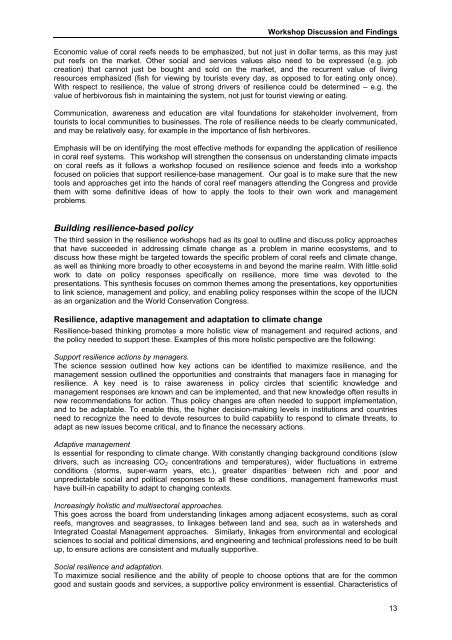Obura2009-IUCN Congress report - Resilience sessions
Obura2009-IUCN Congress report - Resilience sessions.pdf
Obura2009-IUCN Congress report - Resilience sessions.pdf
You also want an ePaper? Increase the reach of your titles
YUMPU automatically turns print PDFs into web optimized ePapers that Google loves.
Workshop Discussion and Findings<br />
Economic value of coral reefs needs to be emphasized, but not just in dollar terms, as this may just<br />
put reefs on the market. Other social and services values also need to be expressed (e.g. job<br />
creation) that cannot just be bought and sold on the market, and the recurrent value of living<br />
resources emphasized (fish for viewing by tourists every day, as opposed to for eating only once).<br />
With respect to resilience, the value of strong drivers of resilience could be determined – e.g. the<br />
value of herbivorous fish in maintaining the system, not just for tourist viewing or eating.<br />
Communication, awareness and education are vital foundations for stakeholder involvement, from<br />
tourists to local communities to businesses. The role of resilience needs to be clearly communicated,<br />
and may be relatively easy, for example in the importance of fish herbivores.<br />
Emphasis will be on identifying the most effective methods for expanding the application of resilience<br />
in coral reef systems. This workshop will strengthen the consensus on understanding climate impacts<br />
on coral reefs as it follows a workshop focused on resilience science and feeds into a workshop<br />
focused on policies that support resilience-base management. Our goal is to make sure that the new<br />
tools and approaches get into the hands of coral reef managers attending the <strong>Congress</strong> and provide<br />
them with some definitive ideas of how to apply the tools to their own work and management<br />
problems.<br />
Building resilience-based policy<br />
The third session in the resilience workshops had as its goal to outline and discuss policy approaches<br />
that have succeeded in addressing climate change as a problem in marine ecosystems, and to<br />
discuss how these might be targeted towards the specific problem of coral reefs and climate change,<br />
as well as thinking more broadly to other ecosystems in and beyond the marine realm. With little solid<br />
work to date on policy responses specifically on resilience, more time was devoted to the<br />
presentations. This synthesis focuses on common themes among the presentations, key opportunities<br />
to link science, management and policy, and enabling policy responses within the scope of the <strong>IUCN</strong><br />
as an organization and the World Conservation <strong>Congress</strong>.<br />
<strong>Resilience</strong>, adaptive management and adaptation to climate change<br />
<strong>Resilience</strong>-based thinking promotes a more holistic view of management and required actions, and<br />
the policy needed to support these. Examples of this more holistic perspective are the following:<br />
Support resilience actions by managers.<br />
The science session outlined how key actions can be identified to maximize resilience, and the<br />
management session outlined the opportunities and constraints that managers face in managing for<br />
resilience. A key need is to raise awareness in policy circles that scientific knowledge and<br />
management responses are known and can be implemented, and that new knowledge often results in<br />
new recommendations for action. Thus policy changes are often needed to support implementation,<br />
and to be adaptable. To enable this, the higher decision-making levels in institutions and countries<br />
need to recognize the need to devote resources to build capability to respond to climate threats, to<br />
adapt as new issues become critical, and to finance the necessary actions.<br />
Adaptive management<br />
Is essential for responding to climate change. With constantly changing background conditions (slow<br />
drivers, such as increasing CO 2 concentrations and temperatures), wider fluctuations in extreme<br />
conditions (storms, super-warm years, etc.), greater disparities between rich and poor and<br />
unpredictable social and political responses to all these conditions, management frameworks must<br />
have built-in capability to adapt to changing contexts.<br />
Increasingly holistic and multisectoral approaches.<br />
This goes across the board from understanding linkages among adjacent ecosystems, such as coral<br />
reefs, mangroves and seagrasses, to linkages between land and sea, such as in watersheds and<br />
Integrated Coastal Management approaches. Similarly, linkages from environmental and ecological<br />
sciences to social and political dimensions, and engineering and technical professions need to be built<br />
up, to ensure actions are consistent and mutually supportive.<br />
Social resilience and adaptation.<br />
To maximize social resilience and the ability of people to choose options that are for the common<br />
good and sustain goods and services, a supportive policy environment is essential. Characteristics of<br />
13


















